Members
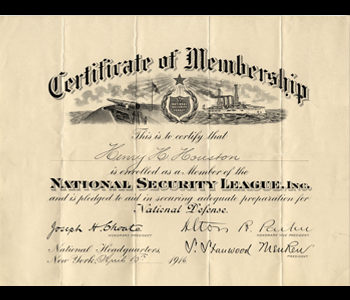
Members of the American Philosophical Society comprised some of the "warrior aristocrats" that gravitated to the National Security League in its early years. The APS has attracted a host of powerful and influential members, and the NSL began by advocating for policies that would have aligned with the promotion of useful knowledge, including international engagement, investments in domestic infrastructure, and a commitment to social harmony. At the same time, many of those policies were problematic. For example, international engagement was often pursued in the interest of U.S. imperial interests.
This section offers a glance at five APS members who brought rich and varied backgrounds to the NSL: Elihu Root (APS 1906), Joseph Hodges Choate (APS 1906), George Wharton Pepper (APS 1897), Talcott Williams (APS 1888), and Hermon Carey Bumpus (APS 1909). The following briefs are drawn from APS records, especially the American Philosophical Society Year Book collection.
Elihu Root
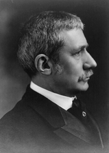
In the summer of 1918, Charles E. Lydecker tasked Elihu Root (1845-1937) with reorganizing the NSL to address postwar problems. When the Americanization pamphlet circulated in 1919, Root carried the title of Honorary President. In addition to his leadership role at the National Security League, Root served as Senator of New York, Secretary of War under President McKinley, and Secretary of State under President Roosevelt; he started the movement for the second of the Hague Peace Conferences; and he received the Nobel Peace Prize in 1912. His obituary in the 1937 Year Book places him in the lineage of society's founder, Benjamin Franklin: "It is not too much to say that Mr. Root was covered with Franklin's mantle."14 Today, however, Root's legacy is recognized for its complexity, especially in light of his role in imperial projects in Hawai'i, the Philippines, Puerto Rico, and Guam.
Joseph Hodges Choate
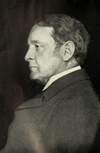
While Joseph Hodges Choate (1832-1917) died before the publication of this Americanization pamphlet, its cover page names him the organization's First Honorary President. Choate pursued a long and productive career in both law and diplomacy, including a high-profile challenge to the Chinese Exclusion Act (1882) on behalf of detained Chinese laborers. Choate also helped found the Metropolitan Museum of Art.15
George Wharton Pepper
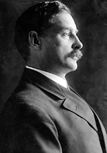
In addition to serving as the Vice President of the National Security League, George Wharton Pepper (1867-1961) taught law at the University of Pennsylvania and served as president the American Law Institute between 1936-1947. Perhaps most remarkably, he was appointed to fill a vacancy in the U.S. Senate after the death of Boise Penrose in 1922, earning the moniker "Senator Pepper," according to his obituary in the 1961 Year Book.16
Talcott Williams
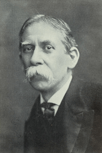
Talcott Williams (1849-1928) and Hermon Carey Bumpus (1862-1943) both served on the NSL Committee for Organized Education, which would have drafted this pamphlet. As the son of Congregational missionaries in Abeih, Turkey, Williams would have brought an immigrant's perspective to that committee. Williams also possessed an extensive background in journalism, serving as editor of the Philadelphia Press and director of the School of Journalism at Columbia University.
Hermon Carey Bumpus
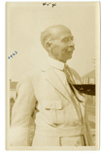
Hermon Carey Bumpus, meanwhile was a leader in the fields of zoology, natural sciences, and natural history. As the first Director of the American Museum of Natural History, Bumpus committed the institution to public education. The 1943 Year Book celebrates his efforts to "[humanize] the Museum by making its vast resources of material and scholarship available and intelligible to the people, especially to the school children."17 Bumpus continued that public outreach throughout the 1920s and 1930s as an organizer of educational programs in the National Parks.
